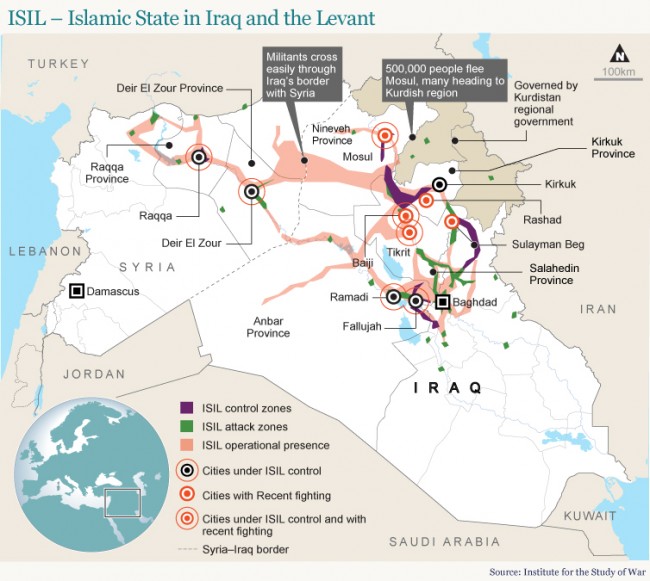Random thoughts about a monster that won’t go quietly away.
By Gary Scarrabelotti
On September 25 our Prime Minister, Tony Abbott, addressed the United Nations with these words (among others):
“ …countries do need to work together to defeat it because about 80 nations have citizens fighting with ISIL and every country is a potential target…
“The Australian Government will be utterly unflinching towards anything that threatens our future as a free, fair and multicultural society…”
It was a nicely chiselled little speech. But maybe the PM said more here than he intended.
Let’s ask ourselves: What’s the driving imperative behind Australia’s so prompt reaction to Islamic State?
Is it not the fact that we are — for better or for worse — a “multicultural society”?
Some people say that multiculturalism is our glory. The PM was pretty clear on that point to the UN. Australia is to the world, he said, “a beacon of hope and exemplar of unity-in-diversity.”
Well, whatever of that, our multiculturalism is also our vulnerability. Without it, Australia might have been slower to react to the sudden eruption from Syria of Islamic State. If we did not have inward-looking Moslem immigrant communities in Melbourne, Sydney and Brisbane – communities troubled by a cadre of alienated, radicalised young men – Australia would not have felt itself so nearly and presently endangered. Surely?
Strategic environment
Even if Islamic State were one day to control a territory that stretched from Damascus to Baghdad that would not represent, in and of itself, a strategic threat to Australia.
True, the glamour won by Islamic State, for upending the political geography of the Middle East, would drive waves of influence across the globe and inspire would-be Sunni insurgents elsewhere. And true, it would be a real worry for Australia if, for example, Islamic State imitators were, one day, to take hold in some part of Indonesia and could not be rooted out. That would have strategic implications for Australia. Right now, though, that’s a far-off scenario.
Long before that could happen, however, an Islamic State triumph would energise its natural rivals: Iran, certainly; and, very likely, both Turkey and Saudi Arabia. With any great Islamic State victory, the survival instincts of its neighbours would kick in. The result would be general war in the Middle East. It’s a war Australia would not need to fight, any more than we needed to take sides in the Iran-Iraq War of 1980 – 88.
So why are we so agitated now?
Home front first
It comes down to our “light on the hill” social experiment with culturally colour-blind immigration. We imported the Middle East into our suburbs.
So, yes, we do have a problem. Do we, however, have to go to Iraq (and maybe also Syria) to remove the temptation to join jihad that Islamic misfits into our society find so alluring?
No, I don’t believe so.
Our focus should be on pre-empting terrorist attacks in Australia. As for cutting off the supply from our shores of recruits to foreign wars we don’t like, well, I wouldn’t make it a priority. If it were up to me, those who want to ‘do’ jihad in foreign climes, I’d let them go: give them time to reach their destinations, cancel their passports, and let fate take its course. The prospect of being rendered stateless should, in any case, sober up a certain number of angry young men. Genuinely penitent jihadis could always be re-issued with a passport as an act of mercy.
I want to go back to those words,
“The Australian Government will be utterly unflinching towards anything that threatens our future as a free, fair and multicultural society…”
Mutli-flawed society
Given that this society is the only one we’ve got, I am all in favour of being “unflinching”. I don’t disbelieve in our multicultural society. That doesn’t make much sense, especially now. It’s like cracking eggs to make an omelette and then declaring that you don’t believe in omelettes. So, “unflinching”, by all means.
Notice, however, what’s happening here. To preserve our model society, we must increase the power of the state to watch over and invade our private “space” and to coerce us. It’s the nature of the multicultural venture.
As my host reminded me over dinner on Sunday evening, just as ancient Roman and Chinese emperors sent armies to suppress ethnic risings in their multi-ethnic empires, so modern multicultural societies — though not up to avenues of crucified or impaled victims – have to deploy some kind of force to the same end: to counteract the tendency of societies made of many cultures, ethnicities and religions to fly apart under stress.
The more multi- we become, the more readily remote conflicts ignite themselves in our midst; the more multi- we become, the less freedom we can enjoy, especially when distant peoples and places explode.
Right now Australia’s problems are at home not abroad. I find myself in rare agreement with President Obama: “no boots on the ground”.
Not yet anyway.
*This is an edited version of an article first published on the Henry Thornton blog.